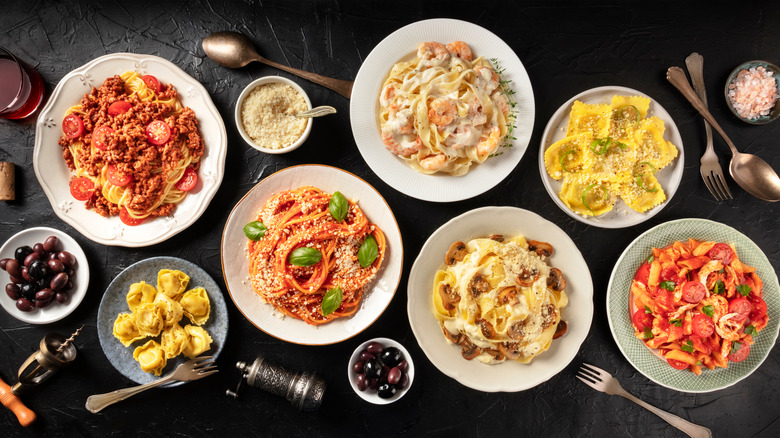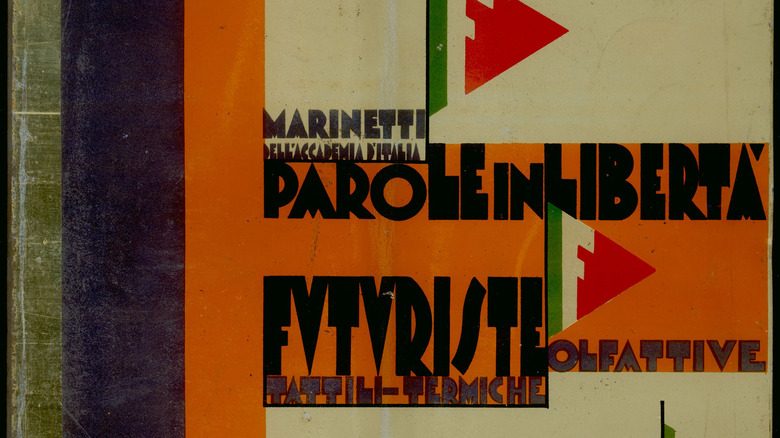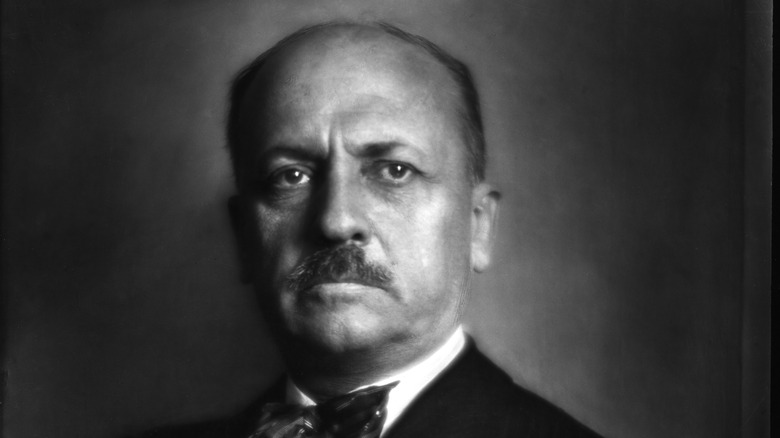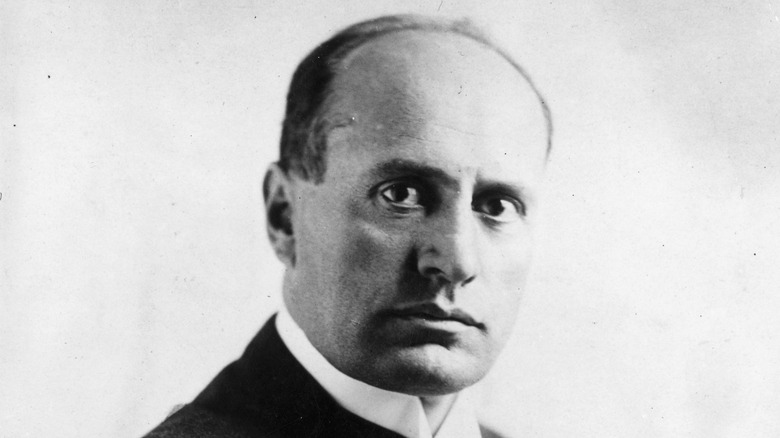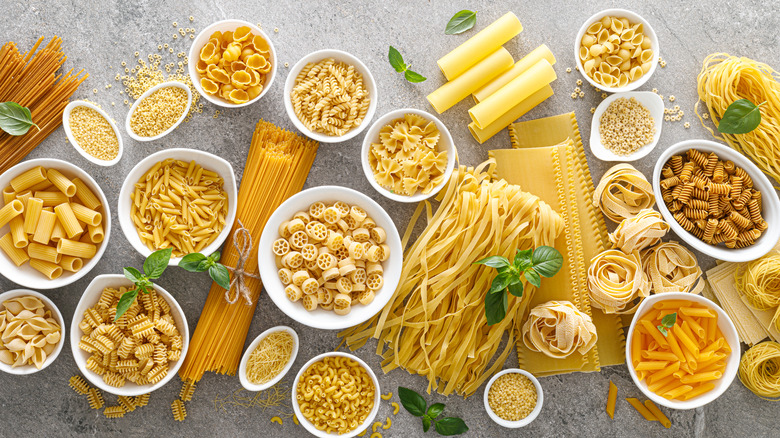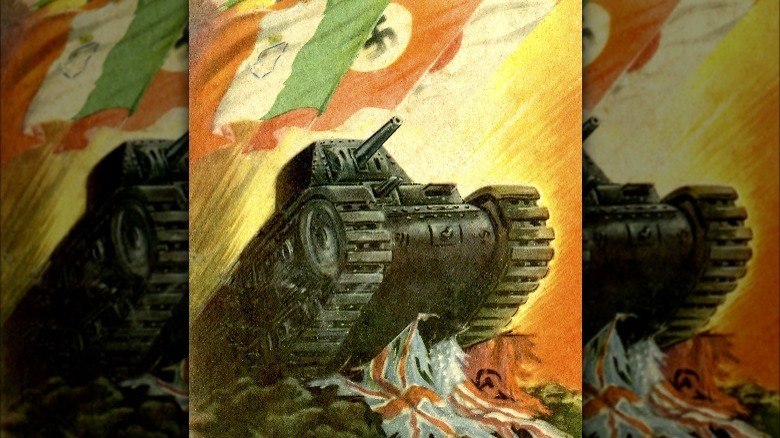Why Fascists Once Tried To Ban Pasta In Italy
Pasta is one of life's many culinary pleasures. And, perhaps, no other country might be best associated with it in popular culture than Italy itself. Pasta is incredibly important to Italian people and culture. As PBS states, its versatility and long-lasting shelf life helped cement it as a go-to food for many generations.
And while Italy may carry a reputation for being one of the pasta capitals of the world, it wasn't always so revered among all Italians. For example, Italian fascists once tried to ban pasta from the country outright (via Mental Floss). How this all happened is a long story, involving Italian Futurism and Mussolini's fascist regime in the 20th century.
But before diving into all of that, one must first know a bit of background on how futurism and, consequently, fascism were responsible for starting a crusade against pasta. That all begins with futurist Filippo Tommaso Marinetti.
What is Futurism?
Many art movements have come and gone throughout history, but some were a bit stranger than others. One peculiar movement was known as futurism. Founded by Filippo Tommaso Marinetti in 1909, futurism was an art movement centered around technology and power, according to Britannica. It was a mishmash of various ideas and concepts, primarily poetry and the visual arts, but can be best described as a glorification of machinery and modernity.
Much of futurist art revolves around key ideas like power, speed, and mechanical violence. Futurists were, above all things, in love with burgeoning technology, such as the automobile, and all of its potential. It's easy to see how a movement obsessed with violence and technological progress could crossbreed so well with another violent movement, fascism.
And, in fact, it did. As explained by Art Mejo, futurism was pretty much the prototype of fascism, embodying many of its ideals, and later on outright merging with Mussolini's ambitions. One such particular instance was when Marinetti outlined the ideal diet as part of his nationalist beliefs. And to him, one food had to go: pasta.
Marinetti thought pasta led people into degeneracy
Marinetti was, to put it lightly, a unique figure in Italian history. He was an Italian French writer, primarily of poetry and novels, who was born on December 22, 1876. His tract on futurism, "The Futurist Manifesto," was published in 1909, which saw the creation of futurism and the proliferation of his ideas across Italy, according to Britannica.
But perhaps one of the oddest things he ever wrote was "The Futurist Cookbook" (1932), which outlined what the proper diet for an average citizen should be. As explained by Open Culture, Marinetti talked about his great disdain for pasta. "Futurist cooking will be free of the old obsessions with volume and weight and will have as one of its principles the abolition of pastasciutta. Pastasciutta, however agreeable to the palate, is a passéist food because it makes people heavy, brutish, deludes them into thinking it is nutritious, makes them skeptical, slow, pessimistic." These writings would draw both interest and hate from the general public, but they were foreshadowed and preceded by an even earlier pasta crusade by none other than Mussolini himself.
Mussolini tried to discourage pasta consumption by promoting rice
Benito Mussolini was one of the most heinous figures to ever walk the planet. A ruthless dictator, Mussolini's own legacy is filled with both great evil and strange details. Boasting the look of a brutish tyrant, he was Italy's prime minister from 1922 to 1943, and is primarily known for utilizing and promoting the ideology of fascism, according to Britannica.
Marinetti was one of the co-writers of the Fascist Manifesto (1919), which gave fascism its political legitimacy, and bridged the gap between it and futurism, as explained in Dahlia Elazar's book "The Making of Fascism: Class, State, and Counter-revolution, Italy 1919-1922." But years before Marinetti began his own ideological war against pasta, Mussolini had tried to fight that battle himself.
Mussolini himself was no fan of pasta, going so far as to discourage its consumption in the 1920s. As relayed by Mental Floss, Mussolini wanted Italy to avoid relying on wheat imports, which were necessary to make pasta, and so ran an anti-pasta campaign throughout the decade. He promoted rice instead, hoping that would cut down on pasta consumption, and went so far as to establish a National Rice Day on November 1. Mussolini never succeeded with his goal of banning pasta outright, but it's clear he enraged noodle lovers in Italy for a long time.
Marinetti's views on pasta were disliked by many
While it might be im-pasta-ble to think of an entire country outright banning something as commonplace and beloved as pasta, that sentiment was shared by many at the time. As Mental Floss states, Mussolini and Marinetti's attacks on pasta were themselves criticized by numerous people. Ernest L. Meyer of The Capital Times in Madison, Wisconsin, had a few choice words to say about it. "Would you abolish macaroni and all its tunefully christened cousins — macaroncelli, foratini, maglietti, ditalini, vermicelli — and reduce Italians to the ugly dissonances of beans, cabbage, chops, chard, and chewing gum? Fie, signor, there is no poetry in your soul, and your palate lacks wit."
Quite a number of Italians took umbrage with the anti-pasta sentiments. A protest letter from the women of L'Aquila, Italy laid out their righteous anger against Marinetta (via Cabinet Magazine). And more outrage from many others followed. The anti-pasta movement seemed to be on its death bed.
Futurism's crusade against pasta died out with the movement
No sooner than it arrived, both Futurism and Fascism's ceaseless war on pasta came to an end. A real war, World War II, was just around the corner.
As Mental Floss states, Marinetti began to try to distance his own movement from Mussolini's, as Fascism grew increasingly connected with Hitler during the war. Marinetti published multiple tirades during that time, denouncing Hitler in an attempt to distance himself from Nazi Germany. The reason for this was because Hitler had denounced modern art like that of Marinetti's as degenerate art, which enraged Marinetti (via Guggenheim).
Marinetti then defended Futurism against Hitler, which led to Mussolini himself dropping Futurism altogether. As Mental Floss explains, Marinetti lost his nerve for attacking pasta in the 1940s, and Mussolini had fully separated himself from the futurist movement. Both fascism and futurism eventually died out when their respective leaders (Marinetti and Mussolini) died, in 1944 and 1945, respectively. Italian fascism died, and pasta survived. Rejoice.
